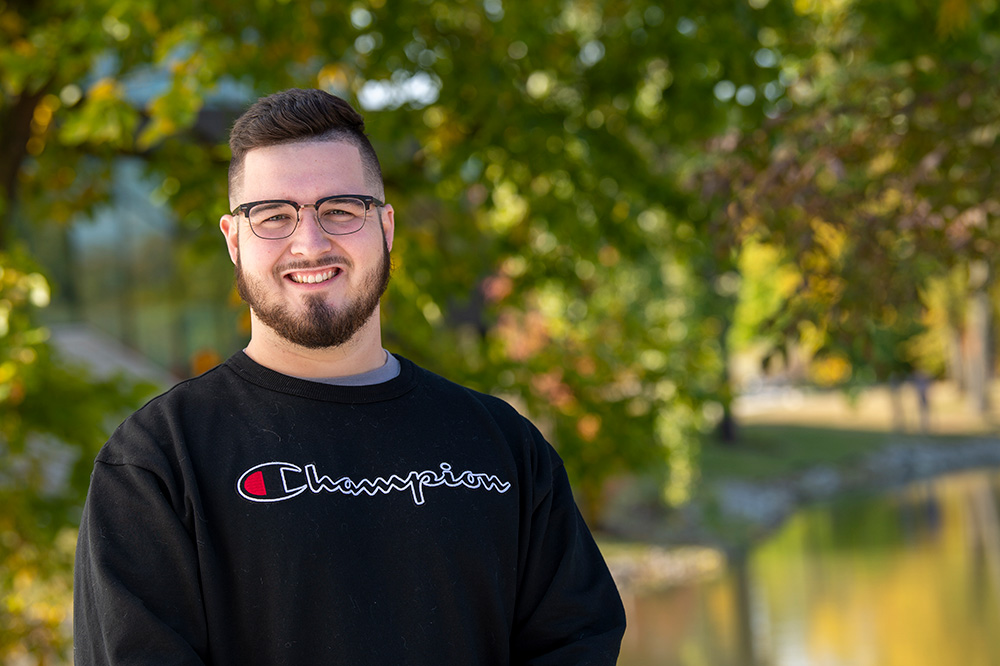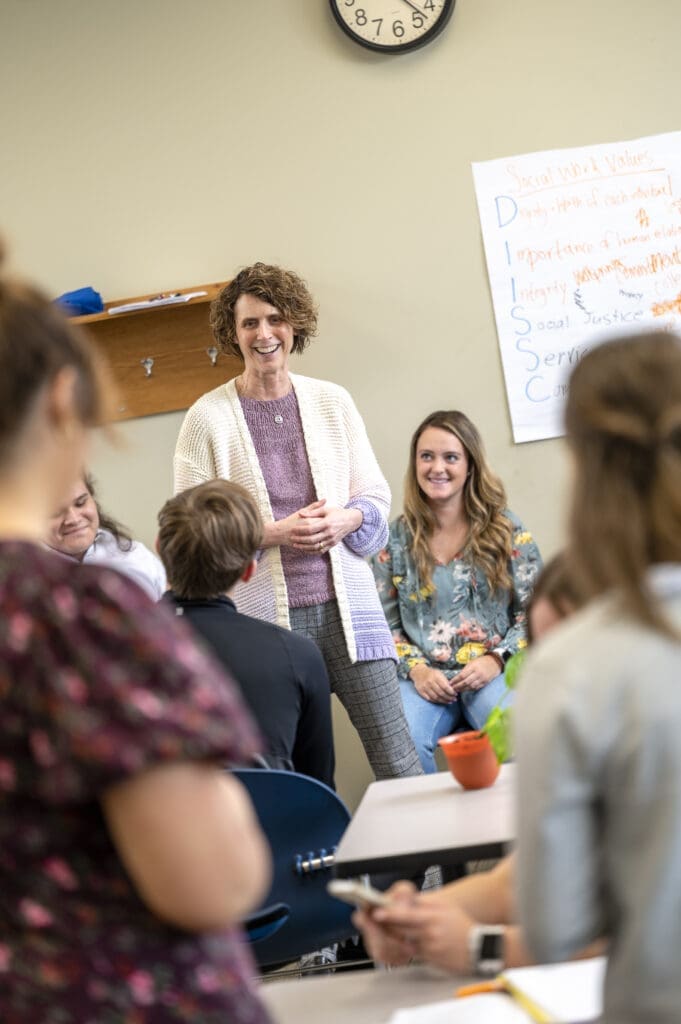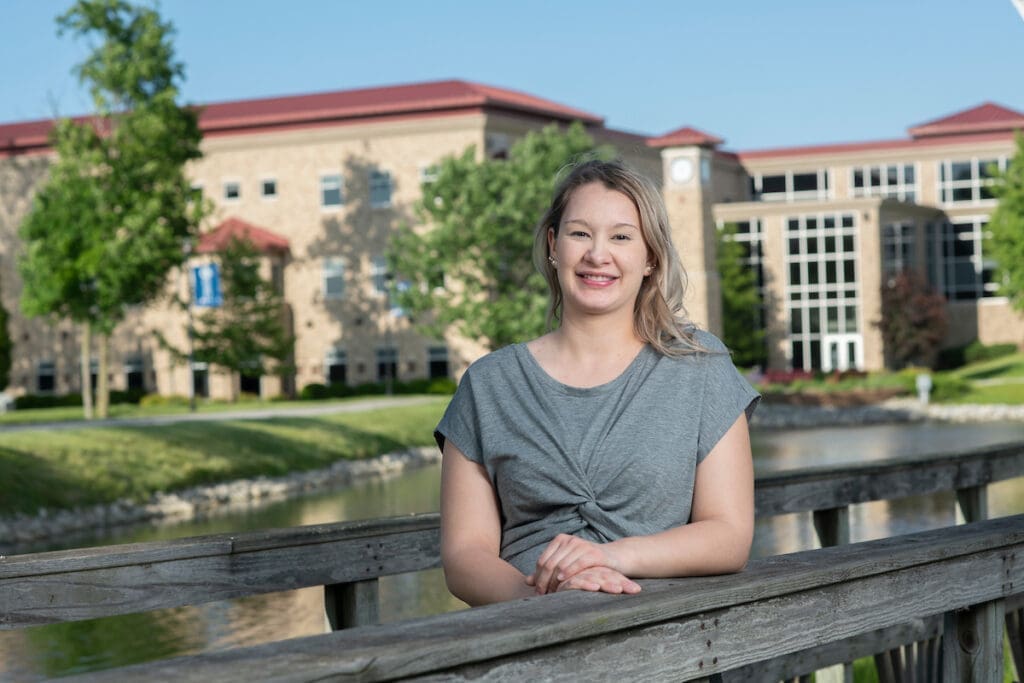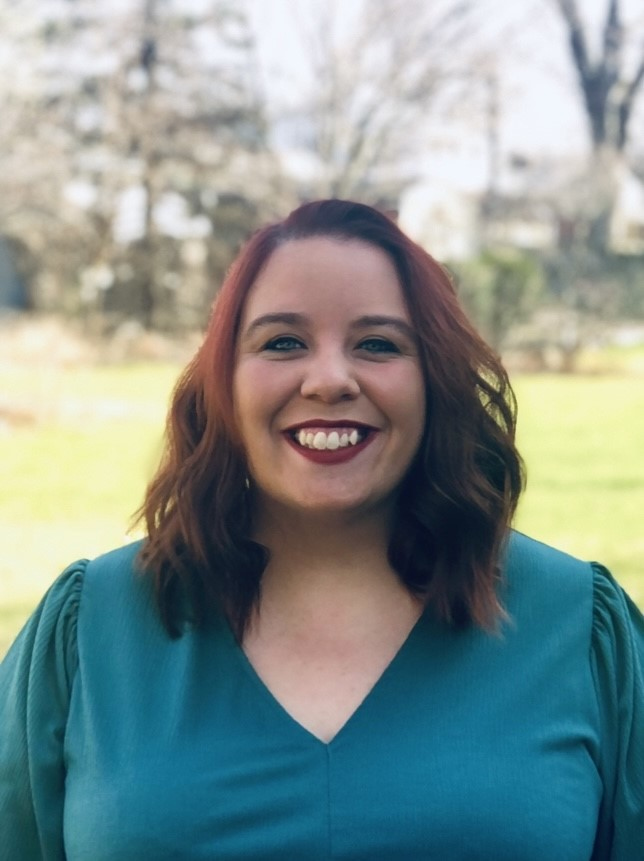Social Work (BSW)
Become a licensed professional social worker (LBSW) and launch a credible and meaningful career.
- Available as
- Major
- Degrees/Options
- Bachelor of Social Work
- Length
- 4 years
- Locations
- Fort Wayne

Why Study Social Work?
As a licensed social worker, you’ll be prepared to make a tangible difference in the lives of individuals and the broader community.
$55,250
Median annual salary for social workers in 2022
BLS.gov
7%
Projected increase in demand for social workers through 2032 (faster than average of all occupations)
BLS.gov
728,600
Number of jobs for social workers in 2022
BLS.gov
Social Work at Saint Francis
Our BSW is a professional degree program that will prepare you for licensure and practice as a generalist social worker. You will leave Saint Francis a confident and competent social worker, prepared to work with diverse communities, honor the importance of human relationships and respect the dignity of everyone you serve. Because social work is licensed at the bachelor-degree level in Indiana, you’ll be ready to take the Association of Social Work Boards (ASWB) certification exam.
Accredited by Council on Social Work Education (CSWE) for more than 30 years, our program adheres to the highest professional standards and competencies. See our BSW Curriculum.
Extensive Field Experiences
You’ll graduate with 530 hours of direct experience via three experiences: The Foundation of Field Practicum, which includes a 50-hour community placement, and two field practicums (internships). Throughout, you’ll work directly with clients under the supervision of practitioners. All placements are personalized to expose students to diverse populations, tasks and experiences.
- Aging and In-Home Services
- Allen County Juvenile Probation
- Cancer Services of Northeast Indiana
- Catholic Charities
- Department of Child Services
- Lutheran Social Services
- Mental Health America
- Parkview Health
- Positive Resource Connection
- Victim Assistance
- VA Hospital
- Parkview Hospital
- Youth Service Bureau (YMCA)
- YWCA
Active Learning
The comprehensive curriculum is complemented by expert faculty, small class sizes and hands-on learning. The latter includes field experiences, guest lectures, field trips, project-based learning and our Immersive Learning Lab. This 3-D environment simulates the real-life situations you’ll encounter in the world.
Personalized and Supportive
As a BSW student, you’ll be taught by professional faculty (with extensive social work experience) who will also mentor and guide you. You’ll benefit from small, interactive classes and personal advising.
Values-Based
Our Social Work program is rooted in the liberal arts and guided by the Catholic traditions of faith and reason. In addition to the professional knowledge, skills and experience, you’ll learn to apply our Franciscan values of respect, service, peace and justice to your work.
Notably, these values align with the professional code of ethics set forth by the National Association of Social Workers, which are upheld throughout the profession.
An Active Social Work Community
Social Work students are highly engaged with the campus, Fort Wayne and the surrounding communities.
- The Social Work Club supports a variety of causes, including domestic violence awareness, Salvation Army family Christmas, suicide prevention and MLK service projects.
- Sigma Eta, Saint Francis’ chapter of the Phi Alpha Honor Society, is a national honor society for social work that recognizes academic achievement and service.
- Social Work students participate in Professional Development Days, which include seminars about careers, professional practice, graduate school and field experiences, led by professional social workers.

“The Social Work program is excellent. The internships and practicum gave me direct real-world experience. It’s different when you get out in a real setting. I was able to apply the interventions and skills we learned in class. I also made great connections with agencies in the area.”
Hunter Clawson ’21 Social Worker, YMCA Youth Service Bureau
“I felt so welcome as a transfer student! I didn’t think I’d fit in so easily, but I blossomed at Saint Francis. There are a lot of activities that purposefully bring people together. I became very involved in the community; I was vice president of the social work club, I did volunteer work and I made great, lifelong friends.”
Laura Janssen ’19 Service Coordinator at the Bureau of Disability Service
“The professional preparation and support I received at USF were a huge part of my ability to build a career. The class assignments related to real-life situations and the field work gave me direct experience and connections with the professional community.”
Kaitlyn Pozorski ’15, MSW, LCSW Client Advocate and Counselor, Cancer Services of Northeast Indiana
About the Field
Social work is different from other helping professions in that it utilizes a strength-based approach: social workers build upon existing resources and skills to improve a client’s quality of life and to implement system-wide change.
An expansive and in-demand field, social workers serve society’s micro, mezzo and macro levels:
- Micro social workers work with individuals and families on issues including housing, healthcare, food and services that support mental and emotional well-being.
- Mezzo social workers connect with smaller groups including support, educational, task and treatment groups.
- Macro social work focuses on large-scale systemic change by advocating for change to policies and laws, organizing communities and crafting social policy.
Social workers are in high demand across the nation. The Bureau of Labor Statistics projects employment for social workers to grow 7% by 2032, with 63,800 openings per year.



What Can You Do with a BSW?
The knowledge, values and skills you’ll gain from our BSW program are transferable across many practice areas. Practice areas and positions for BSW social workers include the following:
- Adoption Specialist
- Care Coordinator
- Case Manager
- Caseworker
- Child and Family Advocate
- Child Protective Services Worker
- Foster Care Worker
- Community Advocate
- Community Organizer
- Community Outreach Specialist
- Grant Writer
- Client/Victim Advocate
- Court Liaison
- Juvenile or Adult Probation Officer
- Police Social Worker
- Discharge Planner
- Emergency Room Social Worker
- Health Coordinator
- Hospital Liaison
- Intake and Assessment Assistant
- Mental Health Aide
- Patient Advocate
- Wellness Promotion
- Grant Writer
- Policy Analyst
- Policy Assistant
- Program Director/Manager
- Program Evaluator
- Community Outreach Coordinator
- Counselor
- School Case Manager
- Student Advocate
Taking Your Career to the Next Level
Many Social Work majors continue in their education. A common next step is a Master of Social Work (MSW), which can lead to becoming a licensed clinical social worker (LCSW), as well as open doors for leadership positions.
Bonus! As a graduate of Saint Francis (a CSWE-accredited program), you’ll have advanced standing, meaning you can complete an MSW in one year at a CSWE-accredited institution.
Saint Francis students have pursued graduate studies at:
- Indiana University at Purdue Fort Wayne
- Indiana University School of Social Work
- Indiana University South Bend
- Marywood Graduate School of Social Work (Pennsylvania)
- The Ohio State University
- University of Illinois at Chicago
- University of Illinois at Urbana-Champaign
- University of South Florida
- University of St. Thomas
- University of Tennessee, Knoxville
- Washington University, Brown School of Social Work
Our BSW students who went on to earn graduate degrees now work as licensed therapists in private practice or in leadership positions (director, executive director, president, CEO) at various healthcare and community organizations.
Accreditation
Saint Francis’ Bachelor of Social Work is accredited by the Council on Social Work Education (CSWE).
CSWE requires each accredited social work program to create and implement a program assessment plan. Saint Francis’ Bachelor of Social Work program completes this plan on an annual basis. Recent summaries of our evaluation results are available:

